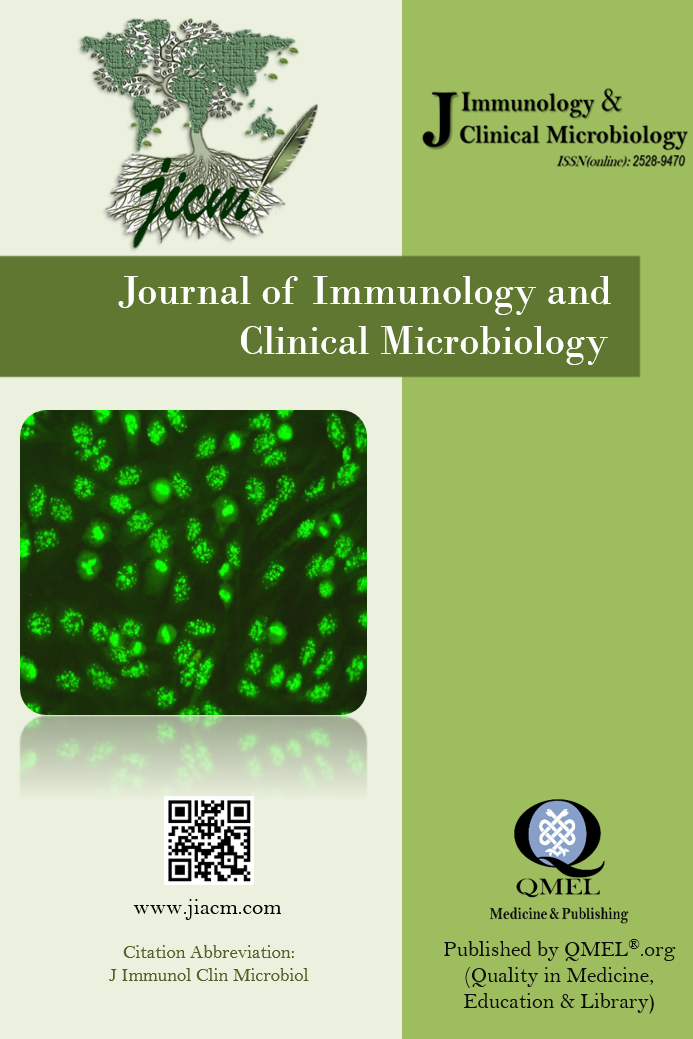Assesment of Platelet Indices in Post-Cesarean Section Surgical Site Infections
Assesment of Platelet Indices in Post-Cesarean Section Surgical Site Infections
platelet count, Mean platelet volume/Platelet ratio cesarean section, surgical site infection,
___
- 1. Sood G, Argani C, Ghanem KG, Perl TM, Sheffield JS. Infections complicating cesarean delivery. Curr Opin Infect Dis. 2018;31(4):368-376.
- 2. Etulain J. Platelets in wound healing and regenerative medicine. Platelets. 2018;29(6):556-568.
- 3. Eisinger F, Patzelt J, Langer HF. The Platelet Response to Tissue Injury. Front Med (Lausanne). 2018;5:317.
- 4. Koupenova M, Clancy L, Corkrey HA, Freedman JE. Circulating Platelets as Mediators of Immunity, Inflammation, and Thrombosis. Circ Res. 2018 J;122(2):337-351.
- 5. Betran AP, Merialdi M, Lauer JA, et al. Rates of caesarean section: analysis of global, regional and national estimates. Paediatr Perinat Epidemiol 2007;21:98–113.
- 6. Li Z, Zeki R, Hilder L, et al. 2013. Australia’s mothers and babies 2011. Perinatal statistics series no. 28. Cat. no. PER 59. Canberra: AIHW National Perinatal Epidemiology and Statistics Unit, 2011.
- 7. Khalid B M Saeed, Richard A Greene, Paul Corcoran, Sinéad M O’Neill. BMJ Open. 2017;7(1):e013037.
- 8. Zuarez-Easton S, Zafran N, Garmi G, Salim R. Postcesarean wound infection: prevalence, impact, prevention, and management challenges. Int J Womens Health. 2017;9:81-88.
- 9. Ketcheson F, Woolcott C, Allen V, Langley JM. Risk factors for surgical site infection following cesarean delivery: a retrospective cohort study. CMAJ Open. 2017;5(3):E546-E556.
- 10. Wloch C, Wilson J, Lamagni T, et al. Risk factors for surgical site infection following caesarean section in England: results from a multicentre cohortstudy. BJOG 2012;119:1324-33
- 11. Schneid-Kofman N, Sheiner E, Levy A, et al. Risk factors for wound infection following cesarean deliveries. Int J Gynaecol Obstet 2005;90:10-5.
- 12. Merchavy S, Levy A, Holcberg G, et al. Method of placental removal during cesarean delivery and postpartum complications. Int J Gynaecol Obstet 2007;98: 232-6.13. Salim R, Braverman M, Teitler N, Berkovic I, Suliman A, Shalev E. Risk factors for infection following cesarean delivery: an interventional study. J Matern Neonatal Med. 2012;25(12):2708–2712.
- 14. Pergialiotis V, Prodromidou A, Perrea DN, Doumouchtsis SK. The impact of subcutaneous tissue suturing at caesarean section on wound complications: a meta-analysis. BJOG. 2017;124(7):1018-1025.
- 15. Haas DM, Morgan S, Contreras K.Vaginal preparation with antiseptic solution before cesarean section for preventing postoperative infections. Cochrane Database Syst Rev. 2014;(9):CD007892.
- 16. Wechter ME, Pearlman MD, Hartmann KE. Reclosure of the disrupted laparotomy wound: a systematic review. Obstet Gynecol. 2005;106:376–83.
- 17. Sandri G, Bonferoni MC, Rossi S, Ferrari F, Mori M, Cervio M, et al. Platelet lysate embedded scaffolds for skin regeneration. Expert Opin Drug Deliv. 2015; 12(4):525–545.
- 18. Iannacone M. Platelet-mediated modulation of adaptive immunity. Semin Immunol. 2016; 28(6): 555–560.
- 19. Yazici S, Yazici M, Erer B, Erer B, Calik Y, Ozhan H, Ataoglu S. The platelet indices in patients with rheumatoid arthritis: mean platelet volume reflects disease activity. Platelets. 2010;21(2):122-5.
- 20. Choi DH, Kang SH, Song H. Mean platelet volume: a potential biomarker of the risk and prognosis of heart disease. Korean J Intern Med. 201;31(6):1009-1017.21. Sezgin M, Tecer D, Kanık A, Kekik FS, Yeşildal E, Akaslan E, Yıldırım G, Şahin G. Serum RDW and MPV in Ankylosing Spondylitis: Can they show the disease activity? Clin Hemorheol Microcirc. 2017;65(1):1-10.
- 22. Gang L, Yanyan Z, Zhongwei Z, Juan D. Association between mean platelet volume and hypertension incidence. Hypertens Res. 2017;40(8):779-784.
- 23. Icli A, Aksoy F, Nar G, Kaymaz H, Alpay MF, Nar R, Guclu A, Arslan A, Dogan A. Increased Mean Platelet Volume in Familial Hypercholesterolemia. Angiology. 2016;67(2):146-50.
- 24. Hartmann LT, Alegretti AP, Machado ABMP, Martins EF, da Silva Chakr RM, Gasparin AA, Monticielo OA. Assessment of Mean Platelet Volume in Patients with Systemic Lupus Erythematosus. Open Rheumatol J. 2018;12:129-138.
- 25. Gasparyan AY, Ayvazyan L, Mikhailidis DP, Kitas GD. Mean platelet volume: a link between thrombosis and inflammation? Curr Pharm Des. 2011;17(1):47-58.
- 26. An increase in mean platelet volume after admission is associated with higher mortality in critically ill patients. Ann Intensive Care. 2014;4:20.
- 27. Ates S, Oksuz H, Dogu B, Bozkus F, Ucmak H, Yanıt F. Can mean platelet volume and mean platelet volume/platelet count ratio be used as a diagnostic marker for sepsis and systemic inflammatory response syndrome? Saudi Med J. 2015 Oct;36(10):1186-90.
- Yayın Aralığı: Yılda 4 Sayı
- Başlangıç: 2016
- Yayıncı: Erkan YULA
Immunotherapeutic CAR T-Cell Engineering
Gülçin GACAR, Elif Deniz UZUN, Sema YUSUFOĞLU
Assesment of Platelet Indices in Post-Cesarean Section Surgical Site Infections
Onikomikoz Tanısıyla Gelen Hastaların Retrospektif Değerlendirilmesi
Ayşegül AKSOY GÖKMEN, Yeşim TOK, Selçuk KAYA, Ali KARAKUZU
